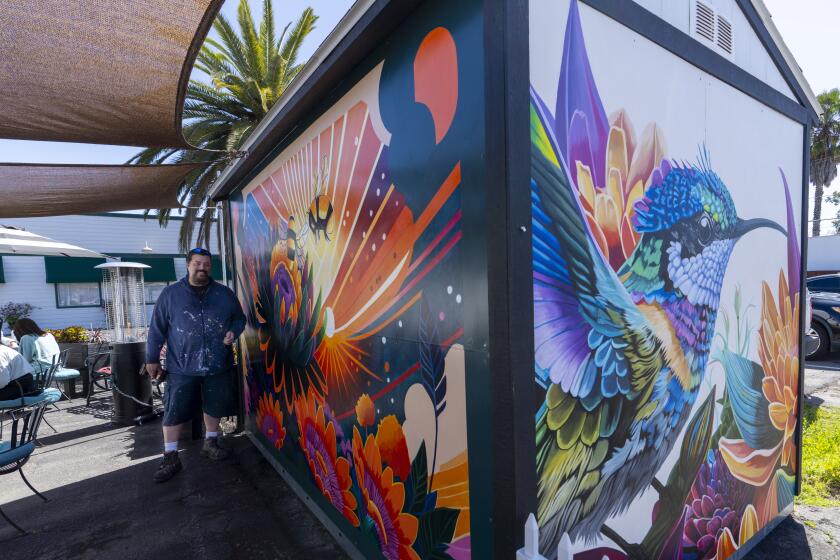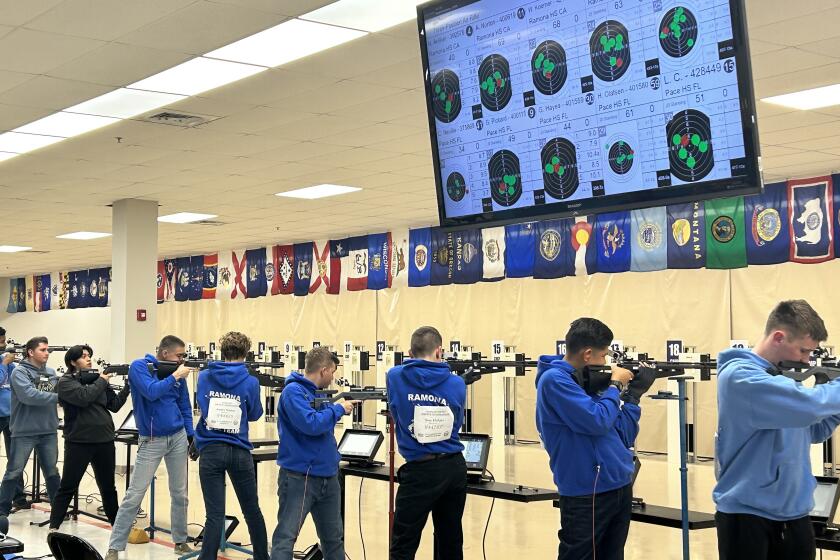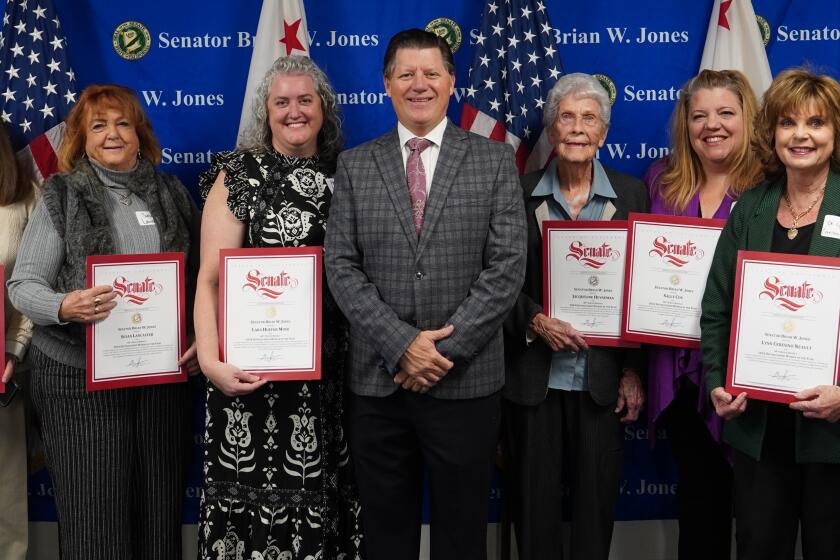Grower’s olive oil wins prestigious Silver Medal
It’s taken a decade of recovery to turn tragedy to triumph at the NES Olive Farm in Ramona. That’s where 150 olive trees took root after the devastating 2007 Witch Creek Fire and recently produced the fruit for award-winning olive oil.
Before the fire swept through grower Yigal Ben-Aderet’s 14-acre property off Rangeland Road in western Ramona, Yigal and his wife Beth Gordon and their three sons enjoyed their surroundings of lush native oak and chaparral along with quail, coyotes, bobcat and other wildlife that occasionally passed through.
Yigal and Beth had moved to Ramona from his native Israel in 1987 for the luxury of living in a wide open space. And the region was a familiar place as Beth is a native San Diegan. They were content raising their boys and sending them to Ramona public schools, and Beth opened High Valley Veterinary Hospital in Ramona in 1995.
Then life took a dramatic turn when the Witch Creek fire struck. Yigal said the fire passed through his property from the northeast, burning a work area and garage but sparing their home.
“There was a note from firemen from Monterey that said they saved the house,” he said. “The fire was really devastating. Everything was gone. Even the ashes were blown by the wind.”

The only thing left for Yigal to do was to rebuild from scratch. With a clean slate to work with, Yigal looked to his heritage for inspiration. His grandmother, Lucy, on his mother’s side was from Athens, Greece, and he was surrounded by his family’s olive orchards while growing up in Israel. Lucy even used to drink a thimble of olive oil every morning throughout her long life.
“She passed away in 2008 at 99 years old and now we use her thimble, hoping for long life, too,” said Yigal, noting that the olive branch is an international symbol of peace. “If you look at olive oil in ancient times, they used it mostly for light and for medicinal purposes and for anointing kings in Biblical times.”
Naming his farm NES because it means “miracle,” Yigal decided on planting a particular type of olive tree, the Picual, which is common in Spain but fairly rare in the United States. He started by planting 50 olive trees, which eventually blossomed into 150 olive trees on four acres of his property. Yigal has help caring for his trees, which are surrounded by native California plants including sage and manzanita, from his neighbor, Mark Johnson, who has an additional 15 olive trees of his own.

Yigal said it is really easy to grow olive trees but it is extremely difficult to produce good quality olives. The main reason is because olive trees left untreated are plagued by the olive fruit fly. Since Yigal has chosen to grow his trees organically, he said he sprays the olives with kaolin clay to discourage the fly from laying eggs in the trees.
Harvesting the olives and turning them into extra virgin olive oil is also challenging. Yigal said harvesting has to be done in one day and converting them to olive oil needs to be done right away because once the olives are picked they start slowly deteriorating, unlike the gradual fermentation process of wine. The enemies are oxidation, light and temperature, he said. Even olive oil in bottles has a limited shelf-life as the oil optimally keeps for two years but ideally should be consumed within a few months once the bottle is opened.
On harvest day Oct. 29, 2017, Yigal said about two dozen friends and family members joined him in picking the olives from early in the morning till evening, and enjoying a dinner of lasagna, wine and, of course, olive oil afterward. He said they gathered more than 1 ton of olives.
That night, Yigal took his load of olives to an olive miller in Templeton, Calif., in San Luis Obispo County, who just raved about the quality of the olive and the oil that was being produced from his crop.
“He said this is the best olive oil produced this year and said I should enter it in the Los Angeles International Extra Virgin Olive Oil Competition,” said Yigal.
Now in its 19th year, the competition is the top-ranking extra virgin olive oil competition in the United States and the fifth worldwide. Yigal said it brings together the highest standards of integrity and professionalism in awarding medals to the best oils from around the globe.
As a boutique olive oil producer, Yigal knew that he would face stiff competition with more than 600 varieties of extra virgin olive oils being represented by 371 producers from 20 countries in Argentina, Australia, Bosnia and Herzegovina, Chile, China, Croatia, Europe, France, Greece, Italy, Lebanon, Japan, Morocco, Portugal, Spain, South Africa, Tunisia, Turkey, Uruguay and the United States.
Even though Yigal knew he would be going up against large growers with as many as half a million trees, he said he gave it his best shot by entering one variety of olive oil contained in three bottles for a panel of 10 judges to evaluate.
When the results of the Los Angeles International Olive Oil Competition were announced Feb. 26, 2018, Yigal realized all his work and effort growing his olive trees for about a decade paid off. He said his entry received 85 points to win a Silver Medal, just one point shy of winning a Gold.

Yigal said he was amazed that his boutique NES Olive Farm, which produced only 120 half-liter bottles in 2016 and 300 bottles in 2017, was able to win a Silver award. In the competition, there were a total of nine Best of Show awards, 29 Best of Class awards, 134 Gold Medal awards, 167 Silver Medal awards, and 94 Bronze Medal awards.
“I had no expectation,” Yigal said. “This was my first time entering and the second year producing olive oil seriously. In 2016 I had made half the amount of olive oil I produced in 2017, and in 2015 I just made it for myself, my friends and family.
“I was really excited,” he added. “It was such a reward for such hard work.”
But Yigal is a bit modest about his abilities as a grower as he has been studying how to grow olive trees, mill olives and how to evaluate olive oil at the University of California, Davis Olive Center off and on for years. As recently as 2016, he took a three-day class there titled “Sensory Evaluation of Olive Oil” and in 2015 he took a four-day “Master Miller” course. This year he plans to attend two more classes.
“This class helped me understand how to make extra virgin olive oil and understand defects in olive oil,” he said of the sensory evaluation class. “UC Davis has established the UC Davis Olive Oil Center to encourage the development of the olive oil industry in California, as it did for the wine industry.”
Yigal’s wife, Beth Gordon, said it’s been an eye-opening experience to learn about the process of olive growing and harvesting from industry conferences but also rewarding to be a first-time winner after watching the trees grow for 10 years.
“I’ve been to a lot of conferences and talked to people who grow olives and learned it’s a whole other world,” Gordon said. “It’s been a fun project. It’s very exciting to have gotten a medal the first time we entered.”
Get the Ramona Sentinel in your inbox
Top news from Ramona, in your inbox every Thursday for free.
You may occasionally receive promotional content from the Ramona Sentinel.





